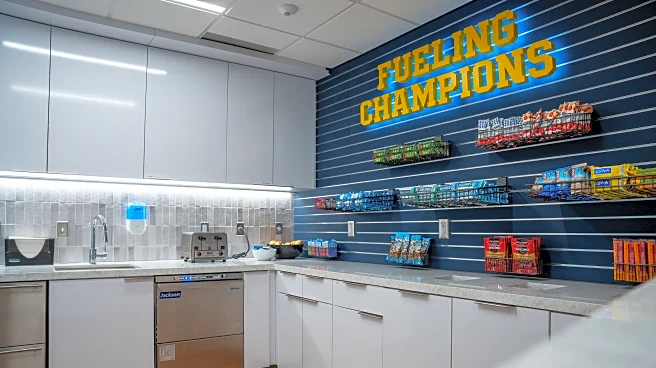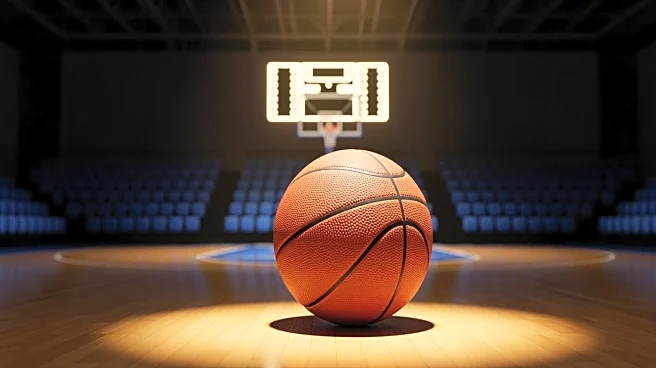If you watched any press conferences after games for the Michigan men’s basketball team, you often saw at least one player sipping on a smoothie. Those smoothies aren’t the typical sugary beverage you’d get from Tropical Smoothie — they are packed with nutrients to get the most out of the key recovery period after a long game.
“I have different smoothies for post-lift versus post-game,” said Hannah Champine (MDN, RDN, CSSD), a nutritionist who works with the basketball teams, golf teams and women’s
soccer team at the University of Michigan. “For post-game, I include tart cherry juice in their smoothies. It’s high in antioxidants, which can help with muscle recovery…so in that smoothie, I do frozen strawberries, frozen blueberries, a vanilla protein drink and tart cherry juice. That’s all that one is, that’s their post-recovery drink, pretty standard for all of them.
“For the different groups, I switch up the frozen fruit bases, I do a different flavor every day with the fruit we have. In the lean group, I did more of a frozen fruit, regular milk, and protein powder combination. In the maintain group, I had the same frozen fruit, and a Gatorade protein shake that has extra carbs and a little sugar in it to help with that muscle recovery. And then the gain group — same as the maintain, and added peanut butter and then this powder, it’s called Cytocarb, a straight Maltodextrin Carbohydrate that has a lot of extra calories and carbs, because carbs are equally important to that in that recovery.”
These aren’t the only beverages for the players. As a preventative measure about an hour before a game, she provides them with what she calls a “Cramp Cocktail,” which consists of:
- Gatorade
- A Gator-lite salt packet
- That same carb powder in the smoothie
The pre-game meals for the men’s team often include a marinara or pesto pasta with a protein source, a vegetable, a salad and a build-your-own yogurt parfait. Champine checks in on the athletes at those meals and encourages more carbs if a players’ plate looks sparse.
When in the facility, players have access to these smoothies, along with protein bars, beef jerky, recovery shakes, various nuts, fruit, yogurt, applesauce and Uncrustables, which Champine said are the first things to go from the fridge each week. They also have the ability to make their own smoothies or overnight oats.
“It was just built last year with the redesign of the facility, it’s like my baby, I love it,” Champine said of the Fueling Center. “It’s beautiful, and that is fully stocked for them at all times with snacks. They’ll come in before a lift, have the ability to take a snack there or have a protein shake after, so a lot of the snacks here I think are where a lot of them get their snacks throughout the day.”
Data is at the forefront of Michigan’s physical training. The team uses DEXA scans (Dual-energy X-ray absorptiometry), a body composition assessment that measures various factors including lean mass and body mass percentage. Those measurements at the start of the offseason are used as a baseline, before Champine and strength and conditioning coach Matt Aldred formulate a custom plan for each player, which can involve losing weight, gaining weight, or maintaining muscle. Goals are set early in the offseason, and each player gets a personalized plan to accomplish those goals. It’s a process designed to make healthy food an instinct for the players.
“There’s a lot of science and numbers that you can get into with nutrition,” Champine said. “I like to take the weight of all that and just make it really easy and translatable to food for them. There’s a certain level of understanding that I want them to have, but their focus is school and basketball. I want them to focus on their food and make it as easy as I can for them to make those choices.”
Champine emphasized the importance of something that many college kids struggle with — diet quality. She is trying to educate the players on healthy eating habits, which can be helpful when players leave the facility.
“They’re coming in potentially having no prior cooking experience or owning any type of pot or pan or anything to work in the kitchen, and now they’re living in apartments and cooking for themselves. It can be a bit of a transition period.” she said. “(There are) a lot of education on the basics at the beginning, as well as individualized plans for meeting their goals. Some of these guys need 4,000-plus calories a day to maintain their weight, so (we’re) helping them recognize how much they need to eat to be able to maintain that.”
Champine takes personal eating preferences and allergies into account when the players are in the facility, but back at apartments, she is also encouraging a healthier option to takeout.
“A lot of these guys are fortunate with NIL money and have the ability to invest a little bit more in their nutrition outside of what we provide in here,” Champine said. “I have a few of them set up with a food delivery service…some of them tried Factor, there’s another company called Cook Unity … they’ve done a great job, the guys actually really like this Cook Unity service.
“There’s a few guys I have on that, just to have ready-to-go meals throughout the week. They’re so busy, it’s hard to make the time to prioritize (cooking). Last year, so many of them were spending money on DoorDash, so I tried to reframe it as, ‘Hey, instead of spending this money on DoorDash, why don’t we spend it on a food delivery service? It’s a little bit better for you. I can help you pick the things being delivered. Spend your money that way.’ And I think that’s been really helpful for the guys.”
With the lore of the “Freshman 15,” snacking after long days can creep on you, so Champine is helping the players make healthy choices. These healthy choices are part of the reason freshman guard Trey McKenney has lost 18 pounds since the start of the offseason.
“He has been a fantastic athlete to work with,” Champine said of McKenney. “He has really taken all the education we have given and done the work to have the result that he has. I always like to say, ‘I can educate you as best I can, I can give you all the tools and all the resources, I can’t eat for you like how Matt (Aldred) can’t lift the weight for you’ … (McKenney) put in all the work and dedication to have that result.”
Champine knows the guilty pleasures players can have, so she works with them to find healthier options to satisfy those cravings.
“Luckily nowadays, there are so many (healthy) options out there,” Champine said. “I went to the grocery store with Trey this summer … he said his weakness is candy. So there’s a section in Whole Foods, they have them in other grocery stores, and there’s a brand called Smart Sweets.
“There’s definitely a place and time where maybe we need to dial back in on the sweets. All foods can fit into your diet, we just want to make it a little healthier. So if you really want to snack, maybe like on a Friday night when you’re watching a movie and you want to have some candy, let’s try this option instead of having the full sugar one that you may have double the portion size of.”
After getting her undergrad degree at Michigan State in dietetics, Champine got her Master’s Degree at Ohio State and worked with both basketball teams in Columbus. After finishing her degree, she got a Gatorade fellowship in 2023, where she was placed at Michigan as an intern before taking a full-time position that opened up. She’s been in Ann Arbor ever since, working to help keep athletes in the best shape possible.
“I actually ranked Michigan as my last option in my fellowship because of where I went to school previously. It was never anything against this place, I love this place, but out of principle I said I could never work at Michigan,” she said through chuckles.
Champine has now worked under two different regimes at Michigan, becoming a key member of transforming players behind the scenes.
“It was such a great transition,” she said on the leadership changes. “I loved Juwan and that staff, too, my first year, but I feel like this team and staff really works well together and I feel like I’ve been fully immersed as a part of the staff, which has been really nice.”
Both Dusty May and Kim Barnes Arico are pretty hands-off with the process. They don’t micro-manage; they leave the nutrition to the experts like Champine.
“They’re both coaches that support nutrition, encourage with the team, and utilize the resources we have here, which I really appreciate,” Champine said.















